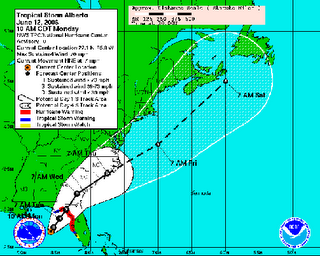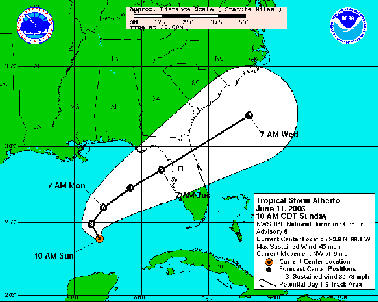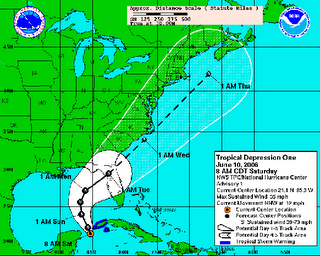
"Make no mistake about it. Oily congressmen -- including our own Jeff Miller (R-Chumukla) -- have betrayed Florida's Gulf Coast for cash."
Most of the rest of the U.S. coastline from Maine to California also is included. Other than some parts of coastal Alaska, the only areas exempted are "the central and western Gulf of Mexico" -- which are so befouled now that it's pointless to include them.
Far from saving money, the non-partisan Congressional Budget Office originally estimated the legislation would cost the U.S. $11 billion over the next decade. That was assuming everything went well and future hurricanes don't cause massive oil leaks as they did last year.
The CBO estimate gave congressmen the re-election willies, so a handful met secretly and came up with post-midnight changes to the Act in the wee hours of Thursday morning. This ensured that virtually no one in Congress had time to read the bill before voting.
It was, as House Science Committee chairman Sherwood Boehlert (R-New York) said, a "travesty" that gives "new meaning to the phrase 'oil slick.'"
Under the bill, it would take a statute passed by the state legislature (and approval of the governor) every five years to keep drilling rigs farther away behind a 100-mile limit. In the case of Florida, that would be the same state legislature that has repeatedly avoided meaningful hurricane insurance reform while finding plenty of time to interfere with brain-dead Terri Schaivo and her husband.
Tragically, Congress' action occurred just one day after the U.S. Minerals Management Service adopted new rules for Gulf drilling rigs appropriate only to Category 1 hurricanes. MMS virtually ignored the risks "that caused much of the destruction and resulting high oil and natural gas prices associated with Ivan, Katrina and Rita."
As Newhouse News Service reports, even "drillers said the new federal rules were not tough enough to ensure that their equipment would stay put during the kind of storms that have churned through the Gulf in recent times."
Make no mistake about it. Oily congressmen -- including our own Jeff Miller (R-Chumukla) -- have betrayed Florida's Gulf Coast for cash. First, there is the outlandish bribe of promised revenue sharing, slipped in at the last moment to buy a few more votes. More fundamentally, you can be sure those voting for drilling rigs were thinking of their personal fortunes.
It will take awhile to show up, but it's as certain as anything in politics that the Judas's within the Florida delegation will be collecting more than 30 pieces of silver from Exxon-Mobil, Chevron, and the rest of the petroleum industry. Want verification? Just ask each of them to sign a pledge to deposit all the money they receive from the oil and gas industry into an escrow account to cover the costs of oil spill clean ups along Gulf coast beaches.
As the Sacramento Record reported last month, in the four years Republican congressman Richard Pombo has been chairman of the House Resources Committee he has collected $375,313 in campaign contributions from oil and gas drillers. Even more will be showing up in his next campaign finance report. Indeed, a year ago "federal records show his re-election campaign received $39,425 from the industry" on the very same day an oil-friendly bill of Polumbo's passed the Republican-dominated House.
What will it all mean for Pensacola Beach? You don't need to imagine. The evidence is right next door.
The Virginia Pilot took a look at Daupin Island, Ala., to see what might happen to Hampton Roads, Va., beaches if oil drillers get their way. What they saw was a paradise lost:
Oil drilling has wrought havoc on Alabama’s Dauphin Island. The beaches are filthy and noisy, the water murky and the horizon marred by drilling platforms. The ravages of the oil industry have rendered Dauphin Island a “paradise lost,” an example of what other states don’t want on their turf.For those who enjoy the emerald green waters and sugar white sands of Pensacola Beach, yesterday's congressional action puts at risk more than tourism and coastal real estate values. As the Sierra Club has explained, human health also is endangered even by so-called "gas only" leases:
Once exploratory drilling commences, the toxic drilling discharges and other routine drilling impacts are similar for either oil or gas exploration and eventual oil or gas development. Drilling operations produce huge quantities of waste. Hundreds of thousands of gallons of drilling muds routinely discharge toxic metals such as lead, mercury and cadmium. Produced water contains dangerous levels of carcinogens and radioactive materials such as benzene, toluene and arsenic.To be fair, this disastrous legislation didn't begin with Jeff Miller. He remains, as always, a bit player in Congress. The fundamental ground work was laid in 2001 when vice president Dick Cheney convened his still-secret "energy task force" (including Enron's now-convicted felon, "Kenny-boy" Lay). That's when the pressure started to "cave-in to industry interests."
Either Miller and the other Republicans in the Florida delegation don't have the spine to resist or they sold out their constituents. Either way, the only remianing hope now resides with Bill Nelson and Mel Martinez in the U.S. Senate.
Nelson has promised a filibuster. Martinez will be busy trying to dig in his heels against White House efforts to march him up to his grave.
Both Senator Nelson and Senator Martinez need to hear from you.
As for Miller, let him know what you think at the polls this November.
From the same
Independent Report is wondering, "If the federal government is so concerned over lost revenue, perhaps they could see fit to rescind some of the gross subsidies and tax breaks currently provided to oil companies."
Fla Politics notes that Governor Jeb Bush "welcomed" the congressional vote to allow drilling rigs within 50 miles of the state coast.






























